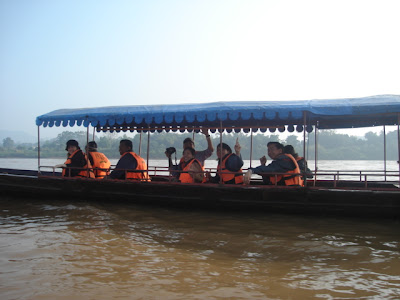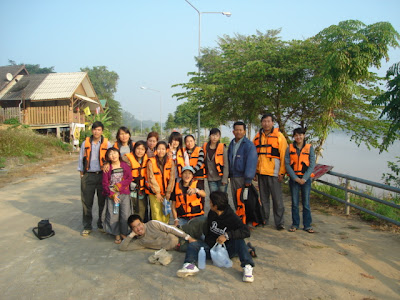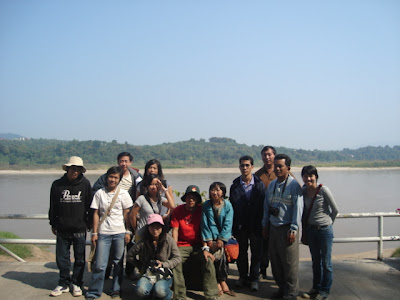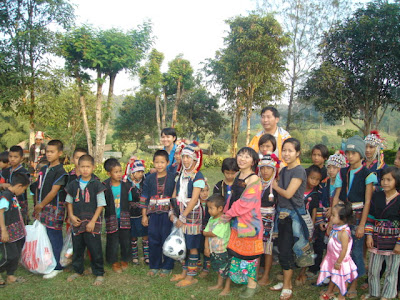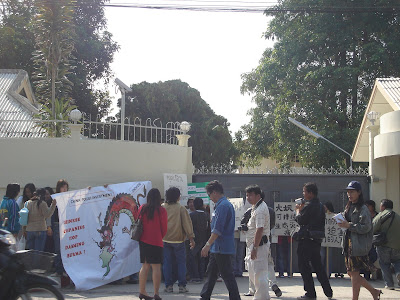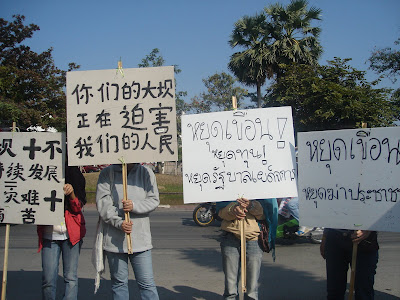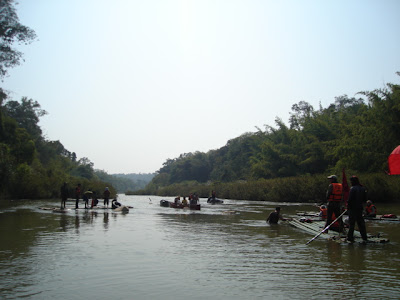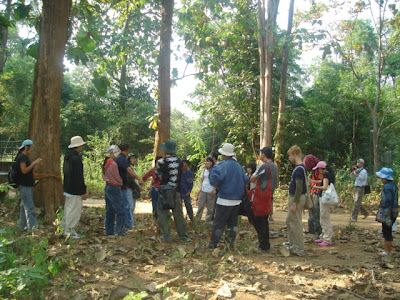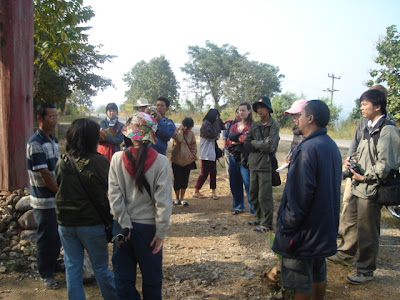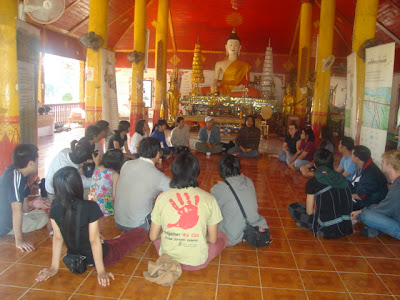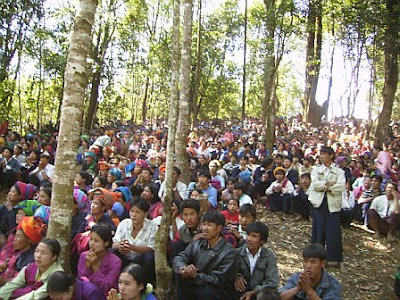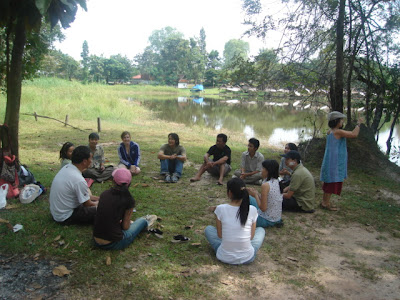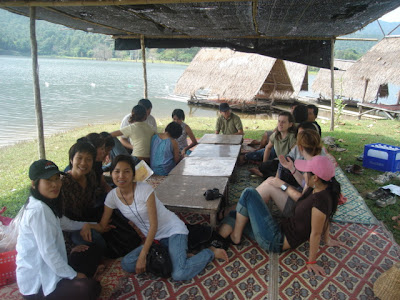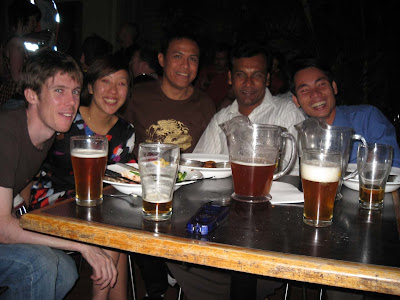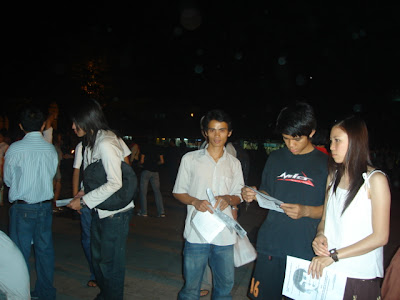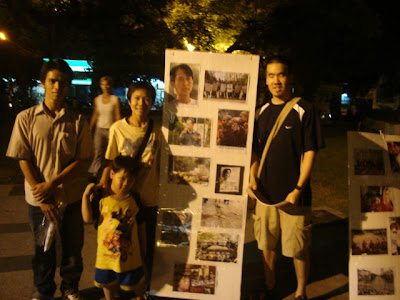Friday, January 25, 2008
The Diplomacy Training Program
The Diplomacy Training Program is calling for applications for its 2nd program on Human Rights and Trade for advocates from the Asia/Pacific Region and Indigenous Australia. The 8-day program will focus on bilateral and regional free trade Agreements (FTA's) in the areas of manufacturing, investment, services, intellectual property and agriculture and their implications on human rights. Advocates who are looking to gain a comprehensive understanding of Human Rights, international trade and how this relates to their community are encouraged to apply. The program will also provide participants with practical skills in advocacy, media and Internet based research specifically tailored to support their advocacy work around Human Rights and Trade. The program will be held from 28 March – 4 April in Dili, East Timor in partnership with the Peace and Democracy Foundation, Timor-Leste I should be grateful if you could circulate this information to your contacts.Please note that the deadline for applications is 1 February 2008. This program is restricted to people from Asia, Pacific and Oceania. You can download a Program brochure and Application form from the DTP website
Wednesday, January 23, 2008
ESCR Training, May 08, Geneva
Course on "Monitoring Economic, Social and Cultural Rights" in Geneva (5-9 May 2008) for staff from small and medium organisations (in particular NGOs) with the know-how to get started in monitoring ESC rights, or in-depth knowledge to enhance their ESCR monitoring work.
The course is organized by Huridocs and the Research Unit on the Right to Food of the Graduate Institute of International and Development Studies (www.righttofood.org). At the end of the course, it is expected that participants will be familiar with the content of economic, social and cultural rights, be able to devise realistic strategies for monitoring ESC rights and documenting the violation and realisation of an ESC right of particular concern to them or their organization, be able to present findings effectively, and be able to devise an advocacy strategy which makes use of the international human rights mechanisms. More information at : www.huridocs.org/training/escr
Best regards, Priscilla Claeys Globalisation and HR Desk
-- Priscilla Claeys(en remplacement d'Elin Wrzoncki)Responsable de programme / Mondialisation et droits humainsDesk Officer / Globalization and Human Rights FIDHInternational Federation for Human RightsFédération internationale des ligues des droits de l'Homme17, passage de la Main d'Or75011 ParisTel : + 33 1 43 55 55 03Fax : + 33 1 43 55 18 80www.fidh.org
The course is organized by Huridocs and the Research Unit on the Right to Food of the Graduate Institute of International and Development Studies (www.righttofood.org). At the end of the course, it is expected that participants will be familiar with the content of economic, social and cultural rights, be able to devise realistic strategies for monitoring ESC rights and documenting the violation and realisation of an ESC right of particular concern to them or their organization, be able to present findings effectively, and be able to devise an advocacy strategy which makes use of the international human rights mechanisms. More information at : www.huridocs.org/training/escr
Best regards, Priscilla Claeys Globalisation and HR Desk
-- Priscilla Claeys(en remplacement d'Elin Wrzoncki)Responsable de programme / Mondialisation et droits humainsDesk Officer / Globalization and Human Rights FIDHInternational Federation for Human RightsFédération internationale des ligues des droits de l'Homme17, passage de la Main d'Or75011 ParisTel : + 33 1 43 55 55 03Fax : + 33 1 43 55 18 80www.fidh.org
Tuesday, January 22, 2008
Vietnam: Unique biodiversity threatened by World Bank-funded cement plant
Posted on 25 June 2003 by Chris Lang IFC is funding a cement plant, partly owned by Swiss company Holcim, in Hon Chong in the southwest of Vietnam. The EIA makes almost no mention of the plant's impact on biodiversity.
By Chris Lang. Published in WRM Bulletin 71, June 2003.
Vietnam's karst landscapes are world renowned. Perhaps the country's most famous limestone scenery is at Ha Long Bay, which has been declared a World Heritage Site. In 1962, the karst landscape at Cuc Phuong in northern Vietnam became the country's first national park. As well as producing spectacular scenery, limestone is the main raw material for cement manufacture and many karst landscapes are under threat. Vietnam is no exception. In 1998, a new cement plant called Morning Star Cement, started operation in Hon Chong, in Kien Giang province in the southwest of Vietnam, near the Cambodian border. The project is a joint venture between a Swiss cement company, Holcim (65%), and Vietnam's Ha Tien I Cement Company (35%). Morning Star has since been renamed as Holcim (Vietnam) Ltd. The International Finance Corporation (IFC, the private sector arm of the World Bank) provided a US$30 million loan to build the 1.7 million tons a year cement plant. Holcim will quarry three limestone mountains near to its cement plant for raw material to produce cement. According to the company's web-site, Holcim Vietnam aims "to achieve first class environmental performance of our operation and assets. Holcim Vietnam recognizes that raw materials, soil, water and air are finite resources which we must handle carefully and responsibly." Yet the environmental impact assessment for the project made almost no mention of the impact on biodiversity caused by Holcim's limestone quarries. The EIA, produced in 1995 by the Environmental Protection Centre in Ho Chi Minh City, simply reported that "Very little wildlife has been seen in the area—only a few monkeys and there is a remarkable lack of birdlife. The EIA did not identify any protected or endangered species of wild life in the area." According to the Karst Waters Institute, a US-based non-profit organisation, the Ha Tien-Hon Chong Karst has a "unique compilation of plant and animal species due in large part to its geographical isolation." The area is habitat to bats, reptiles, birds and small animals. Endangered leaf monkeys have also been reported in the area. In 1997, the Institute reported that "Protests by locals, provincial authorities and scientists from Ho Chi Minh University have, so far, all been ignored by the Hanoi government" and added that Holcim "has proved especially insensitive to environmental issues involving karst". The Institute included the karst landscape of Ha Tien - Hon Chong, where Holcim is operating, in its 1998 list of the ten most endangered karst landscapes in the world. In October 1999, the World Conservation Union (IUCN) Working Group on Caves and Karst reported in its newsletter that in the late 1990s, "The World Bank became concerned about the impact on both biodiversity and cultural heritage which was occurring as a result of limestone quarrying for cement manufacture in the East Asia region." The Bank hired Dr Jaap Vermeulen of the Natural History Museum, Leiden in the Netherlands to "establish a process of inquiry". In January 1999, the World Bank and IUCN organised a workshop on karst in Bangkok, and in September the Bank published the result of Vermeulen's work. Vermeulen and co-author Tony Witten (of the World Bank) confirmed that the EIA of Holcim's operations "did not review the biodiversity of the limestone hills in any detail." The authors commented cautiously that "It was considered prudent to revisit the question of the biodiversity of these limestone hills to determine if additional management interventions are needed in this particular case, and to examine how the IFC and potential future sponsors should address these issues more generally." Using Australian Trust Funds, IFC hired Sinclair Knight Merz, an Australian-based consulting firm, to produce a "study of the limestone resources in southwestern Vietnam" which would "delineate their potential uses for limestone production, biodiversity conservation, forestry production (timber and nontimber), tourism, groundwater recharge, and so forth," according to Vermeulen and Witten. Four years later, this study is not available. In response to a request for the study in March last year, Richard Caines, Coordinator for East Asia and Pacific at IFC, replied, "We have only recently received a final draft. Once the report has been reviewed and approved, our intention is to make it publicly available." In June 2003, Caines stated, "The various issues which slowed its progress related to team selection and gaining the appropriate approvals for the study to be undertaken. These approvals needed to be secured from the funders, IFC management, Holcim management and various Vietnamese government Departments/People's Committees. Consensus decision making amongst such entities is not a fast-track process, I'm afraid." He added that "The report has not been publicly released." A source close to the study reported that the Vietnamese Army ordered that the limestone hills along the Cambodian border be excluded from the Sinclair Knight Merz study. Shortly afterwards, the Kien Giang Provincial Government refused to allow the study to continue. IFC is now working with Holcim and the International Crane Foundation on a project entitled "Sustainable Development and Biodiversity Conservation of Wetlands in the Ha Tien Plain". In 1998, the endangered Eastern Sarus Crane started to use areas of grassland near Hon Chong as an early season feeding ground. The project aims to preserve these grassland areas. Of course, this biodiversity project will in no way affect Holcim's quarrying activities. IFC and International Crane Foundation are allowing Holcim to greenwash its activities by deflecting attention from Holcim's quarries. By not insisting on an adequate EIA, IFC is in breach of the World Bank's safeguard policies. Meanwhile, Holcim continues to quarry 4,000 tons of limestone a day from the mountains near Hon Chong.Filed under: Mining __._,_.___
By Chris Lang. Published in WRM Bulletin 71, June 2003.
Vietnam's karst landscapes are world renowned. Perhaps the country's most famous limestone scenery is at Ha Long Bay, which has been declared a World Heritage Site. In 1962, the karst landscape at Cuc Phuong in northern Vietnam became the country's first national park. As well as producing spectacular scenery, limestone is the main raw material for cement manufacture and many karst landscapes are under threat. Vietnam is no exception. In 1998, a new cement plant called Morning Star Cement, started operation in Hon Chong, in Kien Giang province in the southwest of Vietnam, near the Cambodian border. The project is a joint venture between a Swiss cement company, Holcim (65%), and Vietnam's Ha Tien I Cement Company (35%). Morning Star has since been renamed as Holcim (Vietnam) Ltd. The International Finance Corporation (IFC, the private sector arm of the World Bank) provided a US$30 million loan to build the 1.7 million tons a year cement plant. Holcim will quarry three limestone mountains near to its cement plant for raw material to produce cement. According to the company's web-site, Holcim Vietnam aims "to achieve first class environmental performance of our operation and assets. Holcim Vietnam recognizes that raw materials, soil, water and air are finite resources which we must handle carefully and responsibly." Yet the environmental impact assessment for the project made almost no mention of the impact on biodiversity caused by Holcim's limestone quarries. The EIA, produced in 1995 by the Environmental Protection Centre in Ho Chi Minh City, simply reported that "Very little wildlife has been seen in the area—only a few monkeys and there is a remarkable lack of birdlife. The EIA did not identify any protected or endangered species of wild life in the area." According to the Karst Waters Institute, a US-based non-profit organisation, the Ha Tien-Hon Chong Karst has a "unique compilation of plant and animal species due in large part to its geographical isolation." The area is habitat to bats, reptiles, birds and small animals. Endangered leaf monkeys have also been reported in the area. In 1997, the Institute reported that "Protests by locals, provincial authorities and scientists from Ho Chi Minh University have, so far, all been ignored by the Hanoi government" and added that Holcim "has proved especially insensitive to environmental issues involving karst". The Institute included the karst landscape of Ha Tien - Hon Chong, where Holcim is operating, in its 1998 list of the ten most endangered karst landscapes in the world. In October 1999, the World Conservation Union (IUCN) Working Group on Caves and Karst reported in its newsletter that in the late 1990s, "The World Bank became concerned about the impact on both biodiversity and cultural heritage which was occurring as a result of limestone quarrying for cement manufacture in the East Asia region." The Bank hired Dr Jaap Vermeulen of the Natural History Museum, Leiden in the Netherlands to "establish a process of inquiry". In January 1999, the World Bank and IUCN organised a workshop on karst in Bangkok, and in September the Bank published the result of Vermeulen's work. Vermeulen and co-author Tony Witten (of the World Bank) confirmed that the EIA of Holcim's operations "did not review the biodiversity of the limestone hills in any detail." The authors commented cautiously that "It was considered prudent to revisit the question of the biodiversity of these limestone hills to determine if additional management interventions are needed in this particular case, and to examine how the IFC and potential future sponsors should address these issues more generally." Using Australian Trust Funds, IFC hired Sinclair Knight Merz, an Australian-based consulting firm, to produce a "study of the limestone resources in southwestern Vietnam" which would "delineate their potential uses for limestone production, biodiversity conservation, forestry production (timber and nontimber), tourism, groundwater recharge, and so forth," according to Vermeulen and Witten. Four years later, this study is not available. In response to a request for the study in March last year, Richard Caines, Coordinator for East Asia and Pacific at IFC, replied, "We have only recently received a final draft. Once the report has been reviewed and approved, our intention is to make it publicly available." In June 2003, Caines stated, "The various issues which slowed its progress related to team selection and gaining the appropriate approvals for the study to be undertaken. These approvals needed to be secured from the funders, IFC management, Holcim management and various Vietnamese government Departments/People's Committees. Consensus decision making amongst such entities is not a fast-track process, I'm afraid." He added that "The report has not been publicly released." A source close to the study reported that the Vietnamese Army ordered that the limestone hills along the Cambodian border be excluded from the Sinclair Knight Merz study. Shortly afterwards, the Kien Giang Provincial Government refused to allow the study to continue. IFC is now working with Holcim and the International Crane Foundation on a project entitled "Sustainable Development and Biodiversity Conservation of Wetlands in the Ha Tien Plain". In 1998, the endangered Eastern Sarus Crane started to use areas of grassland near Hon Chong as an early season feeding ground. The project aims to preserve these grassland areas. Of course, this biodiversity project will in no way affect Holcim's quarrying activities. IFC and International Crane Foundation are allowing Holcim to greenwash its activities by deflecting attention from Holcim's quarries. By not insisting on an adequate EIA, IFC is in breach of the World Bank's safeguard policies. Meanwhile, Holcim continues to quarry 4,000 tons of limestone a day from the mountains near Hon Chong.Filed under: Mining __._,_.___
CP to expand its regional maize crops
WALAILAK KEERATIPIPATPONG
The CP Group plans to enlarge its maize plantations in fourneighbouring countries by another 1.67 million rai to provide feed forthe group's livestock business.
Ajva Taulananda, vice-chairman of the group, said the expansion wasplanned over the next two years to bring the total plantation area to3.2 million rai in Vietnam, Burma, Cambodia and Laos.
Its crop areas would climb to 1.7 million rai in Vietnam, 700,000 inBurma, 500,000 in Cambodia and 300,000 in Laos.
The expansion is expected to produce an additional 1.67 million tonnesof maize for CP to supply animal feedmill production and livestockfarming for CP Group and its SET-listed flagship Charoen PokphandFoods Plc. Regional subsidiaries CP Vietnam Livestock Co and CP LaosCo need a large volume of maize each year.
Maize sales in these countries are covered under a tariff-freearrangement backed by the Ayerawaddy-Chao Phraya-Mekong Economic Co-operation Strategy (Acmecs), a programme launched in 2003 to promotethe regional economy by raising farm incomes in Cambodia, Laos, Burma,Vietnam, and Thailand.
CP was among the first Thai corporations to grow maize in the region,planting about one million rai of the crop.
''The programme provides mutual benefits to both local farmers andCP,'' Dr Ajva said. ''Under the contract-farming format, CP provideshybrid seeds and farm technology to farmers and buys the produce backat market prices.''
He said that the group's advanced seed development had boosted yieldsto about 1,000 kilogrammes per rai, well above the average of 650 kgproduced in Thailand at present.
Dr Ajva said that companies under the CP Group used about two milliontonnes of maize per year. Overseas expansion could provide sufficientmaize for their operations amid the fierce battles for grain suppliesbetween the farm and industrial sectors.
Maize exports from the United States would continue decreasing as thecrop would be used more in ethanol plants, he said.
In Thailand, the four million tonnes of output are insufficient tokeep up with demand of about 5.5 million tonnes. Plantations were indecline as farmers turned to other higher-earning crops such as rubberand sugarcane.
The total area of maize fields fell to 5.08 million rai last year,down from 5.67 million in 2005 and 5.14 million rai in 2006.
__._,_.___
The CP Group plans to enlarge its maize plantations in fourneighbouring countries by another 1.67 million rai to provide feed forthe group's livestock business.
Ajva Taulananda, vice-chairman of the group, said the expansion wasplanned over the next two years to bring the total plantation area to3.2 million rai in Vietnam, Burma, Cambodia and Laos.
Its crop areas would climb to 1.7 million rai in Vietnam, 700,000 inBurma, 500,000 in Cambodia and 300,000 in Laos.
The expansion is expected to produce an additional 1.67 million tonnesof maize for CP to supply animal feedmill production and livestockfarming for CP Group and its SET-listed flagship Charoen PokphandFoods Plc. Regional subsidiaries CP Vietnam Livestock Co and CP LaosCo need a large volume of maize each year.
Maize sales in these countries are covered under a tariff-freearrangement backed by the Ayerawaddy-Chao Phraya-Mekong Economic Co-operation Strategy (Acmecs), a programme launched in 2003 to promotethe regional economy by raising farm incomes in Cambodia, Laos, Burma,Vietnam, and Thailand.
CP was among the first Thai corporations to grow maize in the region,planting about one million rai of the crop.
''The programme provides mutual benefits to both local farmers andCP,'' Dr Ajva said. ''Under the contract-farming format, CP provideshybrid seeds and farm technology to farmers and buys the produce backat market prices.''
He said that the group's advanced seed development had boosted yieldsto about 1,000 kilogrammes per rai, well above the average of 650 kgproduced in Thailand at present.
Dr Ajva said that companies under the CP Group used about two milliontonnes of maize per year. Overseas expansion could provide sufficientmaize for their operations amid the fierce battles for grain suppliesbetween the farm and industrial sectors.
Maize exports from the United States would continue decreasing as thecrop would be used more in ethanol plants, he said.
In Thailand, the four million tonnes of output are insufficient tokeep up with demand of about 5.5 million tonnes. Plantations were indecline as farmers turned to other higher-earning crops such as rubberand sugarcane.
The total area of maize fields fell to 5.08 million rai last year,down from 5.67 million in 2005 and 5.14 million rai in 2006.
__._,_.___
Monday, January 21, 2008
3D is seeking an intern in the area of trade and human rights, starting February 2008
Internship position
3D is seeking an intern in the area of trade and human rights, starting February 2008.
What we are looking for
We are looking for someone who can demonstrate good knowledge or easy familiarity with human
rights (particularly Economic, Social and Cultural Rights) and trade policy (particularly WTO)
issues. In particular, candidates should know how to navigate the websites of the Office of the
High Commissioner for Human Rights (www.ohchr.org) and of the World Trade Organization
(WTO).
Excellent English-language writing skills are essential.
We request a minimum commitment of 5 months (full-time) or 6 months (part-time).
What we offer
The intern will be part of a small professional team working on cutting-edge issues. S/he will have
opportunities to attend meetings in the areas of trade and human rights and develop first-hand
experience of how trade and human rights issues are being dealt with in practice. S/he will publish
in the area of trade and human rights, thus being able to demonstrate professional experience and
results to future employers.
Internships with 3D are unpaid but 3D can make a contribution to expenses (transport or meals).
To apply
Please send your curriculum vitae, a short letter explaining why you are interested in the post, and a
brief sample of your writing, to admin@3dthree.org or the postal address above, before 31 January
2008.
3D is seeking an intern in the area of trade and human rights, starting February 2008.
What we are looking for
We are looking for someone who can demonstrate good knowledge or easy familiarity with human
rights (particularly Economic, Social and Cultural Rights) and trade policy (particularly WTO)
issues. In particular, candidates should know how to navigate the websites of the Office of the
High Commissioner for Human Rights (www.ohchr.org) and of the World Trade Organization
(WTO).
Excellent English-language writing skills are essential.
We request a minimum commitment of 5 months (full-time) or 6 months (part-time).
What we offer
The intern will be part of a small professional team working on cutting-edge issues. S/he will have
opportunities to attend meetings in the areas of trade and human rights and develop first-hand
experience of how trade and human rights issues are being dealt with in practice. S/he will publish
in the area of trade and human rights, thus being able to demonstrate professional experience and
results to future employers.
Internships with 3D are unpaid but 3D can make a contribution to expenses (transport or meals).
To apply
Please send your curriculum vitae, a short letter explaining why you are interested in the post, and a
brief sample of your writing, to admin@3dthree.org or the postal address above, before 31 January
2008.
Job Description Program Associate, EarthRights School- Mekong
Job Description
Position: Program Associate, EarthRights School- Mekong
Date Prepared: December, 2007
Reports to: Mekong Program Coordinator
Location: Chiang Mai, Thailand
Purpose: The purpose of this position is to provide 1) logistical, 2) administrative and 3) program support to ERI’s Mekong School Program
Duration/Type: Ongoing, immediate start
Job Responsibilities:
Academic Support
- Assist Program Coordinator in reviewing program applications and interviewing applicants
- Provide academic support to students, helping them with homework assignments and reviewing material covered in class
- Teach introductory course on regional human rights/environmental issues with the assistance of the Program Coordinator
- Advise students on the design and implementation of their field work projects
- Work with local and regional NGOs to coordinate field trips to communities adversely affected by large development projects
- Provide translation from Thai to English during field trips and presentations by local activists
- Assist in maintaining a positive learning community (may include evening and weekend duties)
Administrative Support
- Coordinate students’ travel to and from Chiang Mai, purchase airplane tickets
- Assist students with visa arrangements, coordinate with Chiang Mai immigration and Thai embassies in the Mekong region
- Coordinate visits from visiting lecturers, arrange for their travel, accommodation and sightseeing while in Chiang Mai
- Help with student health care needs (visit doctors and clinics)
- Maintain library resources and keep reading areas tidy
- Arrange or buy office supplies when necessary
- Arrange photocopying when necessary
- Collate and distribute classroom materials as necessary
- Assist in arranging social events
- Keep receipts and enter receipts into Excel spreadsheets to be checked by the Program Coordinator before sending to ERI’s accountants in the United States
Maintaining building and grounds (cleanliness, maintenance, safety)
- Arrange for regular cleaning of the grounds, including cutting grass
- Arrange for repairs when necessary, including water, plumbing, painting, etc.
- Arrange for regular computer maintenance and repairs when necessary
- Communicate with landlord, others (plumber, gardener, electricians, etc.)
- Arrange for phones (student phone, staff phone, phone line); keep phone list
Qualifications:
- Knowledge of human rights and environmental issues in the Mekong region
- Fluent in Thai (spoken and written), Northern or North Eastern dialect preferred
- Knowledge of at least one other Mekong region language preferred
- Good spoken and written English
- Experience providing translation from Thai to English and English to Thai
- Experience working with grassroots communities on environmental and human rights issues
- Experience conducting participatory field-based research
- Basic computer and bookkeeping skills
- Excellent time management and ability to prioritize multiple tasks
- Experience working in a multi-cultural environment
About EarthRights International
EarthRights International (ERI) is a non-governmental, non-profit organization (NGO) combining the power of law and the power of people to protect earth rights. Earth rights affirm the strong connection between human well-being and a sound environment, and include the right to a healthy environment, the right to speak out and act to protect the environment, and the right to participate in development decisions. On the grassroots level, ERI focuses on campaigns in Southeast Asia, but also works internationally to expose abuses and devise strategies for their eradication. Specifically, ERI investigates, monitors, and exposes abuses occurring in the name of development; works to increase the transparency and accountability of governments, trans-national corporations, and international institutions; and protects human rights and environmental defenders. ERI does so through a multifaceted program of investigations, publications, litigation and other legal work; grassroots organizing, education, and training; and local, national, regional, and international advocacy. ERI has offices in northern Thailand and Washington, D.C. ERI was incorporated in the U.S. and has non-profit status pursuant to U.S. Tax Code 501(c)(3). The staff is ethnically diverse (evenly divided between people from the Global North and South), and is composed of lawyers, human rights and environmental activists, and experienced NGO workers.
About the Mekong School
The EarthRights School (ERS) - Mekong is a unique training program for activists from the Mekong Region (Yunnan/China, Burma, Laos, Thailand, Cambodia, and Vietnam) whose work focuses on environmental issues and human rights. The seven month-long training program uses experiential learning methods to equip participants from the region with skills required to conduct research, gather data, and effectively campaign around environmental issues affecting the region. The program provides students with research, writing, and intercultural skills, and substantive knowledge and experience to voice their individual and collective concerns about large-scale development projects and related transparency and participation issues within the Mekong basin. Graduates of the program will form a strong network of environmental advocates who, acting together, can provide support to affected communities who are currently underrepresented.
Application Guidelines:
EarthRights International offers competitive Thai salaries and benefits. The application deadline is 11th February 2008, but we prefer to receive applications as soon as possible. An application consists of a resume and cover letter that directly addresses the selection criteria detailed above. Please post or e-mail applications (e-mail strongly preferred) to:
Contact: Mekong School Program Coordinator
E-mail: mekong@earthrights.org
Mail: P.O. Box 123
Chiang Mai University
Chiang Mai 50202 THAILAND
EarthRights International is an equal opportunity employer and does not discriminate based on race, nationality, ethnicity, religion, political belief, age, gender, or sexual orientation. Applications from women are particularly encouraged. For more information about EarthRights International programs, visit www.earthrights.org
Position: Program Associate, EarthRights School- Mekong
Date Prepared: December, 2007
Reports to: Mekong Program Coordinator
Location: Chiang Mai, Thailand
Purpose: The purpose of this position is to provide 1) logistical, 2) administrative and 3) program support to ERI’s Mekong School Program
Duration/Type: Ongoing, immediate start
Job Responsibilities:
Academic Support
- Assist Program Coordinator in reviewing program applications and interviewing applicants
- Provide academic support to students, helping them with homework assignments and reviewing material covered in class
- Teach introductory course on regional human rights/environmental issues with the assistance of the Program Coordinator
- Advise students on the design and implementation of their field work projects
- Work with local and regional NGOs to coordinate field trips to communities adversely affected by large development projects
- Provide translation from Thai to English during field trips and presentations by local activists
- Assist in maintaining a positive learning community (may include evening and weekend duties)
Administrative Support
- Coordinate students’ travel to and from Chiang Mai, purchase airplane tickets
- Assist students with visa arrangements, coordinate with Chiang Mai immigration and Thai embassies in the Mekong region
- Coordinate visits from visiting lecturers, arrange for their travel, accommodation and sightseeing while in Chiang Mai
- Help with student health care needs (visit doctors and clinics)
- Maintain library resources and keep reading areas tidy
- Arrange or buy office supplies when necessary
- Arrange photocopying when necessary
- Collate and distribute classroom materials as necessary
- Assist in arranging social events
- Keep receipts and enter receipts into Excel spreadsheets to be checked by the Program Coordinator before sending to ERI’s accountants in the United States
Maintaining building and grounds (cleanliness, maintenance, safety)
- Arrange for regular cleaning of the grounds, including cutting grass
- Arrange for repairs when necessary, including water, plumbing, painting, etc.
- Arrange for regular computer maintenance and repairs when necessary
- Communicate with landlord, others (plumber, gardener, electricians, etc.)
- Arrange for phones (student phone, staff phone, phone line); keep phone list
Qualifications:
- Knowledge of human rights and environmental issues in the Mekong region
- Fluent in Thai (spoken and written), Northern or North Eastern dialect preferred
- Knowledge of at least one other Mekong region language preferred
- Good spoken and written English
- Experience providing translation from Thai to English and English to Thai
- Experience working with grassroots communities on environmental and human rights issues
- Experience conducting participatory field-based research
- Basic computer and bookkeeping skills
- Excellent time management and ability to prioritize multiple tasks
- Experience working in a multi-cultural environment
About EarthRights International
EarthRights International (ERI) is a non-governmental, non-profit organization (NGO) combining the power of law and the power of people to protect earth rights. Earth rights affirm the strong connection between human well-being and a sound environment, and include the right to a healthy environment, the right to speak out and act to protect the environment, and the right to participate in development decisions. On the grassroots level, ERI focuses on campaigns in Southeast Asia, but also works internationally to expose abuses and devise strategies for their eradication. Specifically, ERI investigates, monitors, and exposes abuses occurring in the name of development; works to increase the transparency and accountability of governments, trans-national corporations, and international institutions; and protects human rights and environmental defenders. ERI does so through a multifaceted program of investigations, publications, litigation and other legal work; grassroots organizing, education, and training; and local, national, regional, and international advocacy. ERI has offices in northern Thailand and Washington, D.C. ERI was incorporated in the U.S. and has non-profit status pursuant to U.S. Tax Code 501(c)(3). The staff is ethnically diverse (evenly divided between people from the Global North and South), and is composed of lawyers, human rights and environmental activists, and experienced NGO workers.
About the Mekong School
The EarthRights School (ERS) - Mekong is a unique training program for activists from the Mekong Region (Yunnan/China, Burma, Laos, Thailand, Cambodia, and Vietnam) whose work focuses on environmental issues and human rights. The seven month-long training program uses experiential learning methods to equip participants from the region with skills required to conduct research, gather data, and effectively campaign around environmental issues affecting the region. The program provides students with research, writing, and intercultural skills, and substantive knowledge and experience to voice their individual and collective concerns about large-scale development projects and related transparency and participation issues within the Mekong basin. Graduates of the program will form a strong network of environmental advocates who, acting together, can provide support to affected communities who are currently underrepresented.
Application Guidelines:
EarthRights International offers competitive Thai salaries and benefits. The application deadline is 11th February 2008, but we prefer to receive applications as soon as possible. An application consists of a resume and cover letter that directly addresses the selection criteria detailed above. Please post or e-mail applications (e-mail strongly preferred) to:
Contact: Mekong School Program Coordinator
E-mail: mekong@earthrights.org
Mail: P.O. Box 123
Chiang Mai University
Chiang Mai 50202 THAILAND
EarthRights International is an equal opportunity employer and does not discriminate based on race, nationality, ethnicity, religion, political belief, age, gender, or sexual orientation. Applications from women are particularly encouraged. For more information about EarthRights International programs, visit www.earthrights.org
ICBO CM vacancy announcement
Dear Friends, Please see the vacancy announcement below. If you know someone who is eligible for this position, please forward it to them. Best Nilar Institutional Capacity Building Officer
The International Rescue Committee serves refugees and communities victimized by oppression or violent conflict worldwide. Founded in 1933, the IRC is committed to freedom, human dignity, and self-reliance. This commitment is expressed in emergency relief, protection of human rights, post conflict development, resettlement assistance, and advocacy.
The International Rescue Committee (IRC) Thailand program, seeks qualified and motivated Thai national staff to fill a vacancy in its main office in Bangkok, for the position of
Institutional Capacity Building Officer
Location: ICB Resource Center, Chiang Mai
Report to:North Region Sub-grant Manager
Responsibilities:The ICB Program Officer works with Northern Region Sub-grant Manager to ensure successful implementation of CBO activities supported by ICB through trainings, sub-grants, coordination and networking in Chiang Mai Province.
• Responsible for the identification, development and implementation of all project partner training and technical assistance programs• Assists to develop the internal control procedures, procurement and financial manuals as part of their development program.• Assist to develop training curriculum for selected CBOs• Work closely with local groups to ensure that proper training systems are in place to address particular needs• Act as a trainer when necessary to increase capacity building skills of CBOs.• Represent transparently and professionally the IRC, and Institutional Capacity Building Program to the international and local communities of Thailand• Work closely with IRC media and documentation unit to share IRC’s lessons learned, reach out to a wider public and in general better advocate and support ICB program and activities• Develop plans for better inclusion of local stakeholders, i.e. government (local and ministries), business, etc.
Qualifications:• University Degree in Community Development or equivalent• 3 years experience working with NGOs in community development• Training development and implementation experience• Proven experience in developing and implementing needs assessments• Strong computer and internet skills• Strong relationship building skills• Ability to multi-task• Ability to communicate in Burmese and other ethic languages from Burma• Ability and willingness to travel to remote areas.
Application letter together with a copy of the most recent C.V stating, qualifications and experiences should be submitted to the following address.
Human Resources DepartmentInternational Rescue Committee –IRC1028/5 Pong-Amorn Building, 2nd floor, Rama IV road,Thungmahamek, Sathorn, Bangkok 10120
Email: hr@ircthailand.org
All applications will be treated confidentially and not returned,
The International Rescue Committee considers all applicants on the basis of merit without regard to race, national origin, religious beliefs, sexual orientation, age, marital status or physical or mental disability. The IRC is an equal opportunity employer.
The International Rescue Committee serves refugees and communities victimized by oppression or violent conflict worldwide. Founded in 1933, the IRC is committed to freedom, human dignity, and self-reliance. This commitment is expressed in emergency relief, protection of human rights, post conflict development, resettlement assistance, and advocacy.
The International Rescue Committee (IRC) Thailand program, seeks qualified and motivated Thai national staff to fill a vacancy in its main office in Bangkok, for the position of
Institutional Capacity Building Officer
Location: ICB Resource Center, Chiang Mai
Report to:North Region Sub-grant Manager
Responsibilities:The ICB Program Officer works with Northern Region Sub-grant Manager to ensure successful implementation of CBO activities supported by ICB through trainings, sub-grants, coordination and networking in Chiang Mai Province.
• Responsible for the identification, development and implementation of all project partner training and technical assistance programs• Assists to develop the internal control procedures, procurement and financial manuals as part of their development program.• Assist to develop training curriculum for selected CBOs• Work closely with local groups to ensure that proper training systems are in place to address particular needs• Act as a trainer when necessary to increase capacity building skills of CBOs.• Represent transparently and professionally the IRC, and Institutional Capacity Building Program to the international and local communities of Thailand• Work closely with IRC media and documentation unit to share IRC’s lessons learned, reach out to a wider public and in general better advocate and support ICB program and activities• Develop plans for better inclusion of local stakeholders, i.e. government (local and ministries), business, etc.
Qualifications:• University Degree in Community Development or equivalent• 3 years experience working with NGOs in community development• Training development and implementation experience• Proven experience in developing and implementing needs assessments• Strong computer and internet skills• Strong relationship building skills• Ability to multi-task• Ability to communicate in Burmese and other ethic languages from Burma• Ability and willingness to travel to remote areas.
Application letter together with a copy of the most recent C.V stating, qualifications and experiences should be submitted to the following address.
Human Resources DepartmentInternational Rescue Committee –IRC1028/5 Pong-Amorn Building, 2nd floor, Rama IV road,Thungmahamek, Sathorn, Bangkok 10120
Email: hr@ircthailand.org
All applications will be treated confidentially and not returned,
The International Rescue Committee considers all applicants on the basis of merit without regard to race, national origin, religious beliefs, sexual orientation, age, marital status or physical or mental disability. The IRC is an equal opportunity employer.
Internship post available in Geneva - trade and human rights
Dear friends and colleagues,
3D is seeking an intern in the area of trade and human rights, starting February 2008. Please feel free to forward this announcement to anyone you think might be interested.
What we are looking for
We are looking for someone who can demonstrate familiarity with human rights and trade policy issues. In particular, candidates should know how to navigate the websites of the Office of the High Commissioner for Human Rights ( www.ohchr.org) and of the World Trade Organization (www.wto.org).
Excellent English-language writing skills are essential.
We request a minimum commitment of 5 months (full-time) or 6 months (part-time).
The deadline for applications is 31 January 2008.
For more information, please see the attached announcement.
3D à Trade - Human Rights - Equitable Economy
15, rue des Savoises
1205 Genève
Suisse
T +4122 320 21 21
F +4122 320 69 48
i...@3dthree.org
www.3dthree.org
3D is seeking an intern in the area of trade and human rights, starting February 2008. Please feel free to forward this announcement to anyone you think might be interested.
What we are looking for
We are looking for someone who can demonstrate familiarity with human rights and trade policy issues. In particular, candidates should know how to navigate the websites of the Office of the High Commissioner for Human Rights ( www.ohchr.org) and of the World Trade Organization (www.wto.org).
Excellent English-language writing skills are essential.
We request a minimum commitment of 5 months (full-time) or 6 months (part-time).
The deadline for applications is 31 January 2008.
For more information, please see the attached announcement.
3D à Trade - Human Rights - Equitable Economy
15, rue des Savoises
1205 Genève
Suisse
T +4122 320 21 21
F +4122 320 69 48
i...@3dthree.org
www.3dthree.org
6 PhD fellowships at the University of Roma La Sapienza
6 PhD fellowships at the University of Roma La Sapienza
The Università di Roma "La Sapienza" offers n. 6 PhD fellowships for attaining the degree of "Dottore di Ricerca" (Ph. D.) in the Doctoral Schools listed in Appendix 1.Each fellowship amounts to 16,590 € per year (net of government taxes).The Ph.D. programme lasts for three years and may be extended to a fourth year (without grant), subject to approval by the School authorities. At the end of the first and of the second year of attendance, students have to be evaluated as proficient according to the rules of the Schools.
Applications are opened from candidates who:
are not Italian citizens;are not residents of Italy;have obtained abroad an academic qualification by a non-Italian institution equivalent tothe Italian "laurea specialistica" . The equivalence of each qualification to the relevant Italian degree will be ascertained (for the sole purpose of this competition) by the Academic Board of the Schools.
Selection and admissionsApplications will be evaluated on the basis of academic qualification by means of the documents.The evaluation will be made by a selection Board consisting of the Committee for Ph.D. courses of the Università "La Sapienza" and the representatives of the Ph.D. Schools Coordinators. Each selected candidate will be assigned to a Doctorate School. Each Doctorate School will decide in which Programme (within those belonging to the School, see Appendix 1) to enrol the candidate on the basis of both his/her preferences and interests.
Attainment of PhDStudents must attend the courses and the seminars offered by the Programme, pass the connected examinations, and prepare a PhD dissertation, that must have original results. The PhD title is obtained at the end of the third year after the candidate dissertation and its positive evaluation made by an independent Jury appointed by the Rector. The discussion may be delayed with the approval of the School authorities, but not for more than one year. Read more:http://cambodiajobs.blogspot.com/2008/01/6-phd-fellowships-at-university-of-roma.html
The Università di Roma "La Sapienza" offers n. 6 PhD fellowships for attaining the degree of "Dottore di Ricerca" (Ph. D.) in the Doctoral Schools listed in Appendix 1.Each fellowship amounts to 16,590 € per year (net of government taxes).The Ph.D. programme lasts for three years and may be extended to a fourth year (without grant), subject to approval by the School authorities. At the end of the first and of the second year of attendance, students have to be evaluated as proficient according to the rules of the Schools.
Applications are opened from candidates who:
are not Italian citizens;are not residents of Italy;have obtained abroad an academic qualification by a non-Italian institution equivalent tothe Italian "laurea specialistica" . The equivalence of each qualification to the relevant Italian degree will be ascertained (for the sole purpose of this competition) by the Academic Board of the Schools.
Selection and admissionsApplications will be evaluated on the basis of academic qualification by means of the documents.The evaluation will be made by a selection Board consisting of the Committee for Ph.D. courses of the Università "La Sapienza" and the representatives of the Ph.D. Schools Coordinators. Each selected candidate will be assigned to a Doctorate School. Each Doctorate School will decide in which Programme (within those belonging to the School, see Appendix 1) to enrol the candidate on the basis of both his/her preferences and interests.
Attainment of PhDStudents must attend the courses and the seminars offered by the Programme, pass the connected examinations, and prepare a PhD dissertation, that must have original results. The PhD title is obtained at the end of the third year after the candidate dissertation and its positive evaluation made by an independent Jury appointed by the Rector. The discussion may be delayed with the approval of the School authorities, but not for more than one year. Read more:http://cambodiajobs.blogspot.com/2008/01/6-phd-fellowships-at-university-of-roma.html
Scholarships from the Belgian government
Scholarships from the Belgian government*
Belgian development cooperation works according to three distinct systems: direct (bilateral), multilateral and indirect development cooperation. Direct development cooperation is implemented by the Belgian government through the Belgian Technical Cooperation (BTC), in close cooperation with the governments of 18 countries in the South. Multilateral development cooperation goes through international organisations and agencies like the UN. Indirect development cooperation goes through DGDC-funded organisations like VLIR.
There are mainly two sources of scholarships: direct funding (Belgian Bilateral Scholarships) through the Belgian embassies and BTC on the one hand, and indirect funding via those organizations like VLIR.
VLIR offers a number of scholarships every year, so that students from developing countries can access these programmes.
Please note that the VLIR scholarship programme is aimed at individuals from a particular context who meet specific requirements. VLIR provides scholarships to people from developing countries with a minimum of professional experience who occupy key or strategic positions at an institution in their native country. The opportunities for knowledge transfer and knowledge application and transfer after the scholar returns home, is an important scholarship selection criterion.
*Eligible Country:*
- *ASIA*: Bangladesh, Cambodia, China, India, Indonesia, Palestinian Administered Areas, Philippines and Vietnam.
- *AFRICA*: Algeria, Benin, Burkina Faso, Burundi, Cameroon, ( Congo, Democratic Republic) Ethiopia, Guinea, Ivory Coast, Kenya, Madagascar, Mali, Morocco, Mozambique, Niger, Rwanda, Senegal, South Africa, Tanzania, Uganda, Zambia and Zimbabwe.
- *Latin America*: Bolivia, Brazil, Colombia, Cuba, Ecuador, El Salvador, Guatemala, Haiti, Nicaragua, Peru and Surinam.
*Read more:*
http://*cambodiajobs.blogspot.com*/2008/01/scholarships-from-belgian-government.html <http://cambodiajobs.blogspot.com/2008/01/scholarships-from-belgian-go...>
Belgian development cooperation works according to three distinct systems: direct (bilateral), multilateral and indirect development cooperation. Direct development cooperation is implemented by the Belgian government through the Belgian Technical Cooperation (BTC), in close cooperation with the governments of 18 countries in the South. Multilateral development cooperation goes through international organisations and agencies like the UN. Indirect development cooperation goes through DGDC-funded organisations like VLIR.
There are mainly two sources of scholarships: direct funding (Belgian Bilateral Scholarships) through the Belgian embassies and BTC on the one hand, and indirect funding via those organizations like VLIR.
VLIR offers a number of scholarships every year, so that students from developing countries can access these programmes.
Please note that the VLIR scholarship programme is aimed at individuals from a particular context who meet specific requirements. VLIR provides scholarships to people from developing countries with a minimum of professional experience who occupy key or strategic positions at an institution in their native country. The opportunities for knowledge transfer and knowledge application and transfer after the scholar returns home, is an important scholarship selection criterion.
*Eligible Country:*
- *ASIA*: Bangladesh, Cambodia, China, India, Indonesia, Palestinian Administered Areas, Philippines and Vietnam.
- *AFRICA*: Algeria, Benin, Burkina Faso, Burundi, Cameroon, ( Congo, Democratic Republic) Ethiopia, Guinea, Ivory Coast, Kenya, Madagascar, Mali, Morocco, Mozambique, Niger, Rwanda, Senegal, South Africa, Tanzania, Uganda, Zambia and Zimbabwe.
- *Latin America*: Bolivia, Brazil, Colombia, Cuba, Ecuador, El Salvador, Guatemala, Haiti, Nicaragua, Peru and Surinam.
*Read more:*
http://*cambodiajobs.blogspot.com*/2008/01/scholarships-from-belgian-government.html <http://cambodiajobs.blogspot.com/2008/01/scholarships-from-belgian-go...>
Thursday, January 17, 2008
When is the press going to ask about global warming?
The press has been asking the presidential candidates hundreds of questions on a range of issues, but seldom asks about the greatest threat to our planet: the climate crisis. I want to know how the next President -- Democrat, Republican or Independent -- is going to address this critical issue. Don't you?Please click here to sign our petition urging the press to ask the candidates questions about global warming.A League of Conservation Voters study found that ABC's George Stephanopoulos asked presidential candidates more than 767 questions -- only 5 of which were related to global warming. CNN's Wolf Blitzer asked more than 402 questions -- only 5 were about global warming. Sadly, other political commentators and reporters have shown a similar disregard for this key issue.This crisis is solvable but it will take leadership. Technologies are available and numerous policies for accelerating their use have been carefully considered. It is now up to our elected representatives to galvanize implementation. Quickly. The next US President must lead this effort.More important than asking candidates about UFOs, childhood nicknames or sports teams, the press needs to ask candidates how they intend to unlock solutions to the climate crisis. Reporters and their editors need to hear from readers like you and me.Please sign our petition today and urge the press to ask much-needed questions on how candidates will address global warming.
Tuesday, January 15, 2008
Ambassadorial Scholarships
Ambassadorial Scholarships
A mbassadorial Scholarships, The Rotary Foundation's oldest and best-known program, was founded in 1947. Since then, nearly 38,000 men and women from about 100 nations have studied abroad under its auspices. Today it is the world's largest privately funded international scholarships program. Nearly 800 scholarships were awarded for study in 2005-06. Through grants totaling approximately US$500 million, recipients from about 70 countries studied in more than 70 nations.
"The Rotary Foundation does some terrific things, not the least of which is the Ambassadorial Scholarships program." — Michael R. Whiteman, international programs director, University of Idaho
The purpose of the Ambassadorial Scholarships program is to further international understanding and friendly relations among people of different countries and geographical areas. The program sponsors several types of scholarships for undergraduate and graduate students as well as for qualified professionals pursuing vocational studies. While abroad, scholars serve as goodwill ambassadors to the host country and give presentations about their homelands to Rotary clubs and other groups. Upon returning home, scholars share with Rotarians and others the experiences that led to a greater understanding of their host country.
Generous contributions from Rotarians worldwide represent a continued faith that today’s Ambassadorial Scholars will be tomorrow's community and world leaders.
How to apply
Use the Club Locator to find contact information for Rotary clubs. If your hometown does not have a Rotary club, try entering the names of nearby cities. You can also consult a local telephone directory.
Download the Ambassadorial Scholarships application form (PDF)
More info: http://www.rotary.org/EN/ABOUTUS/Pages/ridefault.aspx
A mbassadorial Scholarships, The Rotary Foundation's oldest and best-known program, was founded in 1947. Since then, nearly 38,000 men and women from about 100 nations have studied abroad under its auspices. Today it is the world's largest privately funded international scholarships program. Nearly 800 scholarships were awarded for study in 2005-06. Through grants totaling approximately US$500 million, recipients from about 70 countries studied in more than 70 nations.
"The Rotary Foundation does some terrific things, not the least of which is the Ambassadorial Scholarships program." — Michael R. Whiteman, international programs director, University of Idaho
The purpose of the Ambassadorial Scholarships program is to further international understanding and friendly relations among people of different countries and geographical areas. The program sponsors several types of scholarships for undergraduate and graduate students as well as for qualified professionals pursuing vocational studies. While abroad, scholars serve as goodwill ambassadors to the host country and give presentations about their homelands to Rotary clubs and other groups. Upon returning home, scholars share with Rotarians and others the experiences that led to a greater understanding of their host country.
Generous contributions from Rotarians worldwide represent a continued faith that today’s Ambassadorial Scholars will be tomorrow's community and world leaders.
How to apply
Use the Club Locator to find contact information for Rotary clubs. If your hometown does not have a Rotary club, try entering the names of nearby cities. You can also consult a local telephone directory.
Download the Ambassadorial Scholarships application form (PDF)
More info: http://www.rotary.org/EN/ABOUTUS/Pages/ridefault.aspx
Advanced Study of Khmer (ASK) Program_Summer Abroad Program in Phnom Penh, Cambodia
Advanced Study of Khmer (ASK) Program_Summer Abroad Program in Phnom Penh, Cambodia (Deadline: March 03, 2008)
The Advanced Study of Khmer (ASK) Summer Abroad Program is an intensive eight-week Khmer language-training program held in Phnom Penh, Cambodia. It aims to fill a void in the US academic community by providing 3rd year level Khmer students with a "one-of-a-kind" opportunity to acquire the linguistic foundation necessary to engage in academic research, professional discourse, and cultural immersion with all segments of Cambodian society.
This program is administered by the College of Languages and Literature at the University of Hawai’i (UH), and sponsored by the UH Center for Southeast Asian Studies and the Royal University of Phnom-Penh (RUPP) in Cambodia. The ASK project will increase the number of linguistically competent Khmer-speaking professionals available for employment in federal agencies, departments responsible for national security, and all non-governmental agencies. Also, it will promote scholarly cooperation, cultural and socio-economic understanding between Cambodia and the US.
The ASK curriculum is intensive, and implements seven instructional modules based on ACTFL proficiency guidelines. Instruction is given to small individualized groups taught by Khmer linguists from the Institute of Foreign Languages (IFL) at RUPP. ASK is a structure academic program consisting of four hours of formal classroom instruction each morning, followed by (a three hours) pre-arranged afternoon site visit and related task-based learning opportunities to observe, analyze, interact, and experience issues introduced in the morning sessions, as well as to practice their language skills. These activities include meetings with governmental offices, local non-governmental organizations, businesses, and encourage student interaction with all segments of Cambodian society. In addition, the curriculum includes one week home-stay with rural families in local villages and day-long weekend field trips to outlying areas of Phnom Penh. In language study, immersion is fluency's best guarantee.
The project director for this program is Dr. Chhany Sak-Humphry. She has taught classes in Khmer language at the University of Hawaii for eighteen years and has developed extensive teaching materials for these classes. She strongly believes that total immersion is the best opportunity for students to learn, grow to enjoy, and understand Khmer language, culture and its people. Proficiency in language provides students with the foundation necessary for academic growth, research skills and future career opportunities. In addition, the ASK project will increase the number of Khmer linguistically competent professionals across the United States to supply its shortage domestically and internationally.
Please see the ASK program website to learn more about the program, programrequirements, or to apply online.http://www.manoa.hawaii.edu/ask
http://khmer.hawaii.edu/ask
The Advanced Study of Khmer (ASK) Summer Abroad Program is an intensive eight-week Khmer language-training program held in Phnom Penh, Cambodia. It aims to fill a void in the US academic community by providing 3rd year level Khmer students with a "one-of-a-kind" opportunity to acquire the linguistic foundation necessary to engage in academic research, professional discourse, and cultural immersion with all segments of Cambodian society.
This program is administered by the College of Languages and Literature at the University of Hawai’i (UH), and sponsored by the UH Center for Southeast Asian Studies and the Royal University of Phnom-Penh (RUPP) in Cambodia. The ASK project will increase the number of linguistically competent Khmer-speaking professionals available for employment in federal agencies, departments responsible for national security, and all non-governmental agencies. Also, it will promote scholarly cooperation, cultural and socio-economic understanding between Cambodia and the US.
The ASK curriculum is intensive, and implements seven instructional modules based on ACTFL proficiency guidelines. Instruction is given to small individualized groups taught by Khmer linguists from the Institute of Foreign Languages (IFL) at RUPP. ASK is a structure academic program consisting of four hours of formal classroom instruction each morning, followed by (a three hours) pre-arranged afternoon site visit and related task-based learning opportunities to observe, analyze, interact, and experience issues introduced in the morning sessions, as well as to practice their language skills. These activities include meetings with governmental offices, local non-governmental organizations, businesses, and encourage student interaction with all segments of Cambodian society. In addition, the curriculum includes one week home-stay with rural families in local villages and day-long weekend field trips to outlying areas of Phnom Penh. In language study, immersion is fluency's best guarantee.
The project director for this program is Dr. Chhany Sak-Humphry. She has taught classes in Khmer language at the University of Hawaii for eighteen years and has developed extensive teaching materials for these classes. She strongly believes that total immersion is the best opportunity for students to learn, grow to enjoy, and understand Khmer language, culture and its people. Proficiency in language provides students with the foundation necessary for academic growth, research skills and future career opportunities. In addition, the ASK project will increase the number of Khmer linguistically competent professionals across the United States to supply its shortage domestically and internationally.
Please see the ASK program website to learn more about the program, programrequirements, or to apply online.http://www.manoa.hawaii.edu/ask
http://khmer.hawaii.edu/ask
The Fujitsu Asia Pacific Scholarship (Fujitsu Scholarship) Program
Fujitsu Scholarship
The Fujitsu Asia Pacific Scholarship (Fujitsu Scholarship) Program, sponsored by Fujitsu Limited, provides financial assistance for postgraduate education and cross-cultural management training to participants from the Asia-Pacific region. Fujitsu Limited, an international leader in information technology, telecommunications, semiconductors and electronics that is headquartered in Tokyo, established the Fujitsu Scholarship to commemorate its 50th anniversary in 1985.
The Fujitsu Scholarship program is available for academic programs at JAIMS. JAIMS, located in Honolulu, Hawaii, is a nonprofit postgraduate institute established by Fujitsu in 1972. Many Fujitsu Scholarship recipients/graduates are now working for corporate and social-service organizations in their home countries as well as in other nations.
The Fujitsu Scholarship is available to citizens of selected Asia-Pacific countries in the following formats:
Full-tuition scholarship and a monthly stipend are available to citizens of the following countries: Cambodia, China*, India, Indonesia, Laos, Malaysia, Myanmar*, the Philippines, Sri Lanka, Thailand, and Vietnam*.
Full-tuition scholarship with no monthly stipend is available to citizens of the following countries/areas: State of Hawaii, Australia, Hong Kong, New Zealand, Singapore, South Korea, and Taiwan.
EWKLP Fujitsu Scholarship applicants must submit completed documents listed below.
Fujitsu Scholarship Application(including the essay and work experience information)
Two Recommendation Forms
EWKLP Application Form
TOEFL, TOEIC, or IELTS score report
Official transcripts must be sent directly to JAIMS from all academic institutions attended.
The above items must be sent to: JAIMS Admissions Office, 6660 Hawaii Kai Drive, Honolulu, HI 96825-1192, U.S.A.
Download application materials:You can download the Acrobat PDF version of the Fujitsu Scholarship and EWKLP application documents below.
Fujitsu Scholarship Application Packet (104KB / A4)(including Recommendation Forms)
EWKLP Application Packet (63KB / A4)
Contact detail:
Australia and New Zealand, E-mail:fujitsu.scholarship@au.fujitsu.com
China, E-mail:jaims@cn.fujitsu.com
Hawaii, E-mail:rox@jaims.org
Hong Kong, E-mail:emily@hk.fujitsu.com
India, E-mail:rsaxena@fujitsu-india.com
Sri Lanka, E-mail:rsaxena@fujitsu-india.com
Indonesia, E-mail:scholarship@id.fujitsu.com
Japan, E-mail:dsaka@jp.fujitsu.com
Korea, E-mail:wjlee@kr.fujitsu.com
Malaysia, E-mail:chrisng@fms.my.fujitsu.com
Philippines, E-mail:m.que@ph.fujitsu.com
Singapore, E-mail:colin@sg.fujitsu.com
Taiwan, E-mail:alexlin@tw.fujitsu.com
Cambodia, Laos, Myanmar and Thailand, E-mail:linda@th.fujitsu.com
Vietnam, E-mail:chick@vn.fujitsu.com
More info: http://www.fujitsu.com/global/about/responsibility/community/scholarship/
Monday, January 7, 2008
Last night at Mekong School
This morning I was waken up by alarm clock of Somsy’s mobile phone. Tiredness from graduation party last night didn’t want me to get up from bed. Then I realized that this morning Bong La and Long were leaving at 6 o’clock so I have better go to say good bye to them..
But when I came down stair, everything was still in the dark, quiet and empty. I thought that maybe it was too early and there was something wrong with Somsy’s cell phone. I went up to my bed room and sleepily asking Somsy about the time then she said “5.50!” I ran to Miao Miao’s room because she told me that she would leave very early , but she was not there! She also left?!? Dorn didn’t know what happened but at least her stuff were still there unpacked. Then we all ran to down stair straight to knock the door of Long’s room, no response! Oh, he left! I hadn’t said good bye to them!
Finally Bong La came down from his room with his lug gages. What about Mr.Long?
He slowly opened the door, looked at us like nothing happened, his hair a bit looked like bird nest cause of beer last night I think. After he realized about the time and came back later with his neat hair style as usaual while we kept talking in front of the gate. Chan Dein and Lao Zhang also joint us there.
It didn’t seem like they were leaving, eventually the hardest word came at last. What we could do was just keep saying that we will meet up again someday and keep in touch. Then the red car of Phi Pramuan brought them apart from us far way..
I had to do some thing otherwise I couldn’t stop thinking so I started clean up the yard. I felt much better because yesterday I watched 2 movies at the hospital with Somsy while my friends were working hard for preparing for party. Beautiful flowers were thrown away, yesterday they were so important for us but today they would become compose soon. Little by little, everything becomes the same again, then I heard a sound of laugh came from some where in my mind. We played badminton here for several months, earlier some people even didn’t know how to play it, I am sure they will miss it, like I am missing them now.
Breakfast went on slowly, a familiar sound of door opening comes from Anh’s room. He was still in white T-shirt with a sleepy face like everyday. We just looked at each other, didn’t know what to say then end up with a cup of coffee. Phi Ad came down and joint ‘Khao Tom’ with us. Lao Zhang tried to talk about politics among China and Vietnam, but this morning it was not very interesting for me like before.
About 9 o’clock the taxi had arrived, a hard time came again. We all went together to the front gate. Phi Pramuan also came so I was a bit busy talking to him about the mistake. I was able to shake hand with Anh for the last time. I went to “Wai” phi Ad and told her that I would call her. Miao Miao and Somsy started crying. No, don’t cry, I told myself. After that I straight to guitar and play “Duang Jam Pa song” again and again thinking that I should have sung better last night. I felt a bit confused with my own feeling like trying to hide sadness somewhere.
Taking a bath made me feel much better then I also started to pack my crazy stuff. Many times that we want to keep everything but it is impossible. I tried to keep as much as I can even though I know I will throw them away one day, but not this time. I kept looking for something to do so I thought about the students next year, what can I do for them? I designed some activities for building relationship which we didn’t do much at the beginning, but that was enough to make us have a very strong friendship like a big family.
Chan Dein ran to us once we were not ready to say another word like good bye again. We went to see him off at the gate. I hugged him like my brother then he played with Dorn like they used to plays for last several months. “Suu! Suu!” ( Fight! Fight!) it was the last word I could say to him. I promised myself that I will visit him in Kanchanaburi.
Many people kept sitting at the balcony outside, warmth was around us even there was no word. However, we couldn’t stop the time, this time Tee Pee, Miao Miao and Somsy were leaving. We left about 3.30 pm and straight to train station for Tee Pee and Miao Miao, other people were Tee Pee’s boyfriend and a Korean girl. We kept talking on the red car. Miao Miao was preparing to visit Laos, I really want to go with them if I had enough money. At least I got a small job in Laos for 6 months so I will be there soon.
Miao Miao made me cry at the train station. I do believe that I will meet her again and we will get the grant from RCSD together. Tee Pee’s boyfriend was busy with lots of lug gages of Tee Pee. I hope that I will get a wedding card from them soon.
Then it was Somsy’s turn, it was so quick so I couldn’t think about any thing much. Somsy found later that the flights was 3.00 o’clock!!! And it was 4.00 already!!! I made a big mistake, 3.00 o’clock was the time for flight not the time for leaving from home!
My face turned pale, I tried to do something otherwise Somsy had to take a bus home. Fortunately we were able to change the flight. Lao Zhang was the happiest one then he kept singing along the way back. I was also very happy because I didn’t want to stay alone tonight. We celebrated by going to have Som Tam and Kai Yang at our favorite place. There were many many people still but today it seemed like only Tin was able to talk more than us. I asked Non to stay with us, at least to see his smile make me feel a bit better.
Time for dinner came but there was no sound of buffalo bell by Phi Ad today. Lao Zhang said “Eat! Eat! Eat!” but no one really wanted to eat, only tried to accompany Lao Zhang. I looked at the living room and there was no Chan Dein lying down there, my tear started to come out. Phi Ad was not in front of television waiting for Jumong. There was no Vietnamese song from Anh’s computer. Only the sound of sigh from us time to time. Somsy got message from Long, we were so happy but that also made us miss him more.
Tin is the last one who said good bye to us today. I wanted to say more but felt like there is no word anymore. Tomorrow I am leaving by bus to Khonkaen, I will meet my family tomorrow. Many friends might be at home now, I wish they all are happy and I know they miss us too.
Tonight the restaurant nearby has a small party and they play very nice songs but it sounds so sad for me today. It would be better if I had more friends around me now. Only mosquitoes and Non who tries to be around me during this hard time..
Tomorrow my life will go on like everybody. I will do what I can do and what I want to do. I hope that our friendship will be with us forever like the flow of Mekong River. Only our hands will make our dream come true, not for us but the poor people along there.
And I will meet them all again from watershed to the mouth of river, my Mekong friends..
Ae
21 December 2007
8.26 PM
Chiangmai, Thailand
This morning I was waken up by alarm clock of Somsy’s mobile phone. Tiredness from graduation party last night didn’t want me to get up from bed. Then I realized that this morning Bong La and Long were leaving at 6 o’clock so I have better go to say good bye to them..
But when I came down stair, everything was still in the dark, quiet and empty. I thought that maybe it was too early and there was something wrong with Somsy’s cell phone. I went up to my bed room and sleepily asking Somsy about the time then she said “5.50!” I ran to Miao Miao’s room because she told me that she would leave very early , but she was not there! She also left?!? Dorn didn’t know what happened but at least her stuff were still there unpacked. Then we all ran to down stair straight to knock the door of Long’s room, no response! Oh, he left! I hadn’t said good bye to them!
Finally Bong La came down from his room with his lug gages. What about Mr.Long?
He slowly opened the door, looked at us like nothing happened, his hair a bit looked like bird nest cause of beer last night I think. After he realized about the time and came back later with his neat hair style as usaual while we kept talking in front of the gate. Chan Dein and Lao Zhang also joint us there.
It didn’t seem like they were leaving, eventually the hardest word came at last. What we could do was just keep saying that we will meet up again someday and keep in touch. Then the red car of Phi Pramuan brought them apart from us far way..
I had to do some thing otherwise I couldn’t stop thinking so I started clean up the yard. I felt much better because yesterday I watched 2 movies at the hospital with Somsy while my friends were working hard for preparing for party. Beautiful flowers were thrown away, yesterday they were so important for us but today they would become compose soon. Little by little, everything becomes the same again, then I heard a sound of laugh came from some where in my mind. We played badminton here for several months, earlier some people even didn’t know how to play it, I am sure they will miss it, like I am missing them now.
Breakfast went on slowly, a familiar sound of door opening comes from Anh’s room. He was still in white T-shirt with a sleepy face like everyday. We just looked at each other, didn’t know what to say then end up with a cup of coffee. Phi Ad came down and joint ‘Khao Tom’ with us. Lao Zhang tried to talk about politics among China and Vietnam, but this morning it was not very interesting for me like before.
About 9 o’clock the taxi had arrived, a hard time came again. We all went together to the front gate. Phi Pramuan also came so I was a bit busy talking to him about the mistake. I was able to shake hand with Anh for the last time. I went to “Wai” phi Ad and told her that I would call her. Miao Miao and Somsy started crying. No, don’t cry, I told myself. After that I straight to guitar and play “Duang Jam Pa song” again and again thinking that I should have sung better last night. I felt a bit confused with my own feeling like trying to hide sadness somewhere.
Taking a bath made me feel much better then I also started to pack my crazy stuff. Many times that we want to keep everything but it is impossible. I tried to keep as much as I can even though I know I will throw them away one day, but not this time. I kept looking for something to do so I thought about the students next year, what can I do for them? I designed some activities for building relationship which we didn’t do much at the beginning, but that was enough to make us have a very strong friendship like a big family.
Chan Dein ran to us once we were not ready to say another word like good bye again. We went to see him off at the gate. I hugged him like my brother then he played with Dorn like they used to plays for last several months. “Suu! Suu!” ( Fight! Fight!) it was the last word I could say to him. I promised myself that I will visit him in Kanchanaburi.
Many people kept sitting at the balcony outside, warmth was around us even there was no word. However, we couldn’t stop the time, this time Tee Pee, Miao Miao and Somsy were leaving. We left about 3.30 pm and straight to train station for Tee Pee and Miao Miao, other people were Tee Pee’s boyfriend and a Korean girl. We kept talking on the red car. Miao Miao was preparing to visit Laos, I really want to go with them if I had enough money. At least I got a small job in Laos for 6 months so I will be there soon.
Miao Miao made me cry at the train station. I do believe that I will meet her again and we will get the grant from RCSD together. Tee Pee’s boyfriend was busy with lots of lug gages of Tee Pee. I hope that I will get a wedding card from them soon.
Then it was Somsy’s turn, it was so quick so I couldn’t think about any thing much. Somsy found later that the flights was 3.00 o’clock!!! And it was 4.00 already!!! I made a big mistake, 3.00 o’clock was the time for flight not the time for leaving from home!
My face turned pale, I tried to do something otherwise Somsy had to take a bus home. Fortunately we were able to change the flight. Lao Zhang was the happiest one then he kept singing along the way back. I was also very happy because I didn’t want to stay alone tonight. We celebrated by going to have Som Tam and Kai Yang at our favorite place. There were many many people still but today it seemed like only Tin was able to talk more than us. I asked Non to stay with us, at least to see his smile make me feel a bit better.
Time for dinner came but there was no sound of buffalo bell by Phi Ad today. Lao Zhang said “Eat! Eat! Eat!” but no one really wanted to eat, only tried to accompany Lao Zhang. I looked at the living room and there was no Chan Dein lying down there, my tear started to come out. Phi Ad was not in front of television waiting for Jumong. There was no Vietnamese song from Anh’s computer. Only the sound of sigh from us time to time. Somsy got message from Long, we were so happy but that also made us miss him more.
Tin is the last one who said good bye to us today. I wanted to say more but felt like there is no word anymore. Tomorrow I am leaving by bus to Khonkaen, I will meet my family tomorrow. Many friends might be at home now, I wish they all are happy and I know they miss us too.
Tonight the restaurant nearby has a small party and they play very nice songs but it sounds so sad for me today. It would be better if I had more friends around me now. Only mosquitoes and Non who tries to be around me during this hard time..
Tomorrow my life will go on like everybody. I will do what I can do and what I want to do. I hope that our friendship will be with us forever like the flow of Mekong River. Only our hands will make our dream come true, not for us but the poor people along there.
And I will meet them all again from watershed to the mouth of river, my Mekong friends..
Ae
21 December 2007
8.26 PM
Chiangmai, Thailand
Tuesday, January 1, 2008
Monday, December 17, 2007
Tuesday, December 4, 2007
Monday, December 3, 2007
Anaconda
The story was happened while every body were sleeping like child, but me I could not sleep at all, because some idea came up in my head and pulled my cool hand to pick up a blue pen and bring out the white paper, then pulled my legs to step out from the bed room. Because a short and little girl were sleeping. So I stepped my feet down stair slowly, I did not want to wake Miao Miao up.
The first sign that came up in my head while I closed my eyes and take a long breathe was “Green”
I would like to say this word “Ngam Lai” (very beautiful). We drove from the feet of the mountain to the top. Luxury cars are moving, I sat inside the car and near window, and I looked out from the window and saw wonderful place, thick forests, long and curve way. I just imagine and feel like I was on the back of anaconda who are moving up and down, curve and straight a long the remote area up to the highest mountain in the wonderful land, fresh air, peaceful, and people are friendly and very kind, smile on their faces made me fall and fall and fall in love with this warm and peaceful village.
The village are surrounding by mountains, natural atmosphere and Sakura bloom in December, waterfall and streams, which villagers build micro-hydro power for their village and transfer to the city.
No doubt, why people are in love with Mae Kam Pong village.
It so beautiful, charming and unique, quirky and joyous for living things those are around. It’s impossible to erase it from my memory; I stuck in Mae Kam Pong village.
We walked through the thick forest and aim to the waterfall, very high waterfall. The waterfalls crawl down from the mountain, and dropped her big drop into the earth. And keep crawl a long the way it wants to make streams in the forest, it seems never stop crawling. I saw the big drop keep spring a long and streaming through the village down to the low land to feed all living things in the world.
Some of us get tired and sit in the small cabin while some of us keep walking up to the top of the waterfall, 15 minutes later we were on the top, I browsed my eyes around down to beyond. “Oh! I am the king, king of the jungle” said I
The rain sprayed her tear around the forest and dropped the pure tear on my cheek, a moment the rain gone and we all down to join with our team.
Time for us to say goodbye, the forest looked sad and blue, then she cried and dropped her tears all over us. We all got wet and started walking down to the cars in the village.
I lost my heart there, it is astrayed somewhere in the jungle, and I will come back and find where my heart is!
“Goodbye Mae Kam Pong Village,
I am sure we will meet again in the near future
No matter how far we are and
No matter how long will we meet?
Our hearts beat as one.
I will miss you.” Buzzing in the dept of my heart
Blue fingers
Thursday, November 22, 2007
Thursday, November 15, 2007
Monday, November 12, 2007
Thursday, November 8, 2007
Saturday, November 3, 2007
Sign the petition letter
Dear friends,
As you all know that in Burma, China-owned corporations arerapidly raising their investment in energy sector, particularly inhydropower development projects. Indeed, those investments are not environmentally friendly, ecologically unsustainable, and the benefitswould definitely flow to military regime's pocket. Moreover, therewould be dramatic negative impacts to environment, society and economy of the community, where large dams are going to be built.
The following letter is requesting the Chinese government to take suchactions regarding their investments in Burma,
1.Carrying out comprehensive environmental and social impact assessments (EIAs and SIAs) on projects abroad and make those publiclyavailable, in order to adequately determine the feasibility ofprojects before concluding any agreements.
2. Keeping affected communities informed from the outset of all plans regarding hydropower development projects and involved indecision-making regarding those projects. This includes publiclyreleasing dam feasibility studies, investment and financialagreements, MOUs, MOAs, and clear information regarding responsible parties.
We, Burma Rivers Network, need your solidarity. If you agree pleasesend your organization's endorsement at this address –burmariversnetwork@gmail.com, before 19, November, 2007. Yourendorsement should include your organization name and organizationalemail address or directly can sign at http://www.PetitionOnline.com/brn2007/petition.html
In solidarity
Burma Rivers Network
Burma Rivers Network is comprised of representatives of differentethnic organizations from potential dam affected communities in Burma. Our mission is to protect the health of river ecosystems and sustainbiodiversity, rights and livelihoods of communities.
As you all know that in Burma, China-owned corporations arerapidly raising their investment in energy sector, particularly inhydropower development projects. Indeed, those investments are not environmentally friendly, ecologically unsustainable, and the benefitswould definitely flow to military regime's pocket. Moreover, therewould be dramatic negative impacts to environment, society and economy of the community, where large dams are going to be built.
The following letter is requesting the Chinese government to take suchactions regarding their investments in Burma,
1.Carrying out comprehensive environmental and social impact assessments (EIAs and SIAs) on projects abroad and make those publiclyavailable, in order to adequately determine the feasibility ofprojects before concluding any agreements.
2. Keeping affected communities informed from the outset of all plans regarding hydropower development projects and involved indecision-making regarding those projects. This includes publiclyreleasing dam feasibility studies, investment and financialagreements, MOUs, MOAs, and clear information regarding responsible parties.
We, Burma Rivers Network, need your solidarity. If you agree pleasesend your organization's endorsement at this address –burmariversnetwork@gmail.com, before 19, November, 2007. Yourendorsement should include your organization name and organizationalemail address or directly can sign at http://www.PetitionOnline.com/brn2007/petition.html
In solidarity
Burma Rivers Network
Burma Rivers Network is comprised of representatives of differentethnic organizations from potential dam affected communities in Burma. Our mission is to protect the health of river ecosystems and sustainbiodiversity, rights and livelihoods of communities.
Thursday, November 1, 2007
Happy Birthday to you Long.
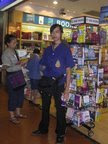
1 of NOVEMBER
* Has a lot of ideas
* Difficult to fathom
* Thinks forward
* Unique and brilliant
* Extraordinary ideas
* Sharp thinking
* Fine and strong clairvoyance
* Can become good doctors
* Careful and cautious
* Dynamic in personality
* Secretive
* Inquisitive
* Knows how to dig secrets
* Always thinking
* Less talkative but amiable
* Brave and generous
* Patient
* Stubborn and hard-hearted
* If there is a will, there is a way
* Determined
* Never give up
* Hardly become angry unless provoked
* Loves to be alone
* Thinks differently from others
* Sharp-minded
* Motivates oneself
* Does not appreciates praises
* High-spirited
* Well-built and tough
* Deep love
Monday, October 29, 2007
Sunday, October 28, 2007
Friday, October 26, 2007
Mekong School Application Form
Mekong School Application
Please give us the following information. If you do not want to send this information or you have any questions, you may contact us by email at mekong@earthrights.org.
Name:………....………........…………………………………………………………………
Date of Birth: …....……… Age:……… Sex: M / F Religion: ……………………
Ethnicity:……………...………………… Nationality: …………………………………
Languages that you can speak: ……………………………………………………………………
Marital Status: Single Married
Contact Information: (Please give at least one of the following.)
Address: ……………………………………………………………………………………
……………………………………………………………………………………
Telephone: ………………………………
Fax: …………………......………………..
E-mail: ........………………………………
Education
Highest Education Level Completed:……………………………………………………………..
What schools have you attended?
Name: ……………………………………… Location:………………Dates: ……………....
Name: ……………………………………… Location:………………Dates: ……………....
Name: ……………………………………… Location:………………Dates: ……………....
What trainings or workshops have you attended?
1. Name of Training:………………………………………....…………………………………
Organized by: ……………....………….... Location:………………………Dates: ……………....
2. Name of Training:………………………………………....……………………….…………
Organized by: ……………....………….... Location:………………………Dates: ……………....
3. Name of Training:………………………………………....……………………… ……………
Organized by: ……………....………….... Location:………………………Dates: ……………....
4. Name of Training:………………………………………....……………………………………
Organized by: ……………....………….... Location:………………………Dates: ……………....
5. Name of Training:………………………………………....……………………… ……………
Organized by: ……………....………….... Location:………………………Dates: ……………....
6. Name of Training:………………………………………....……………………… ……………
Organized by: ……………....………….... Location:………………………Dates: ……………....
Work History
Where are you currently working? (Name of Organization) ……………………………………….
………………………………………………………………………………………………………..
Address:
……………………………………………………………………………………………..
………………………………………………………………………………………………………..
Current Position:……………………………………………………….......……………………...
Responsibilities/Duties: ………………………………………………………...................……….
……….............……….............……….............……….............………...................………………..
How long have you worked here? …….…………………...………………………………………
What other jobs do you or did you have? These can be paid or unpaid positions.
Job title: ……………………………………… Organization:………...………………………….
Location: ……………………………………… Dates:………………………............……………
Responsibilities/Duties: …………....……………………………………………………………….
…………………………………………………………………………………………………….....
Job title: ……………………………………… Organization:…..……………………………….
Location: ……………………………………… Dates:………………………............…………...
Responsibilities/Duties: …………....………………………………………………………………
……………………………………………………………………………………………………...
Job title: ……………………………………… Organization:…..……………………………….
Location: ……………………………………… Dates:………………………............…………...
Responsibilities/Duties: …………....………………………………………………………………
……………………………………………………………………………………………………...
Name of the persons writing your recommendation letters:
1. Name: …………………………………………….. Organization: ……………………………
Address: ……………………………………………………………………………………………
…………………………………………………………………………………………….
Telephone: …………………………………………………………………………………………
Email Address: ……………………………………………………………………………………..
2. Name: ……………………………………………..... Organization: ………………………….
Address: ……………………………………………………………………………………………
…………………………………………………………………………………………….
Telephone: …………………………………………………………………………………………
Email Address: ……………………………………………………………………………………..
Please return to the following addresses by March 10, 2008:
Contact Person: Mekong Program Coordinator
E-mail: mekong@earthrights.org
Mail: P.O. Box 123
Chiang Mai University
Chiang Mai 50202 THAILAND
Application Essays
Please answer the following questions in short essays (3 paragraphs each, no more than 350 words) (1 to 2 pages each) and send to us by post or e-mail by March 10, 2008.. (Please answer in English).
1. What problems do you think happen to people and the environment from large-scale hydropower development projects? Explain these problems in detail using your own words. Give specific examples of problems you know about when possible.
2. During the ERS program you will be asked to investigate an issue relating to hydro-development, water issues, and international financial institutions. Think about your own experiences with these topics, what problem or issue would you like to learn more about? Please explain how and where you could find information about this topic. (In your own words, answer this question in English)
3. What difficulties do civil society organizations face in the Mekong basin when they campaign on issues relating to hydro-development, water issues, and international financial institutions? How do you think these difficulties could be overcome?
I certify that I wrote these essays by myself. Signed __________________________
Please return to the following addresses by March 10, 2008
Contact Person: Mekong Program Coordinator
E-mail: mekong@earthrights.org
Mail: P.O. Box 123
Chiang Mai University
Chiang Mai 50202 THAILAND
ERS Mekong Training Program 2008
RECOMMENDATION FOR ………………………………………………………
(Name of Applicant)
SECTION 1:
Name: ………………………………………………………
Name of organization ………………………………………………………
Responsibility within organization ………………………………………………….......
SECTION 2:
Please answer the following questions:
How long have you know the candidate?: ………………………………………………..
……………………………………………………………………………………………..
……………………………………………………………………………………………..
Please explain your relationship to applicant:
………………………………………………………………………………………………
………………………………………………………………………………………………
………………………………………………………………………………………………
Please comment on why you support the applicant’s candidature for the ERS Mekong program:
………………………………………………………………………………………………
………………………………………………………………………………………………
………………………………………………………………………………………………
Please comment on the applicant using his or her knowledge about Human Rights and the Environment in the future:
………………………………………………………………………………………………
………………………………………………………………………………………………
………………………………………………………………………………………………
SECTION 3:
Please give an assessment of the applicant skills and abilities in the following areas.
Please write a number between 1 and 5.
Note: 1 = Not sure / 2 = Poor / 3 = Good / 4 = Very Good / 5 = Excellent
Applicant’s ability to remain independent: (.………)
Applicant’s level of maturity (……….)
Applicants ability to grow and develop skills and experience (……….)
Applicant’s ability to act responsibly and take responsibility for own actions: (……….)
Applicant’s level of motivation: (……….)
Applicant’s tolerance of difference and diversity in race, religion, gender, sexual orientation etc.: (……….)
Ability of applicant to foster friendly and productive community relations: (……….)
Ability of applicant to apply knowledge and skills to real life situations: (……….)
Ability of applicant to communicate openly and reasonably: (……….)
Ability of the applicant to work in team settings: (……….)
Applicant’s experiences/interest in human rights & environmental issues: (……….)
Applicant’s ability to communicate in the English language: (……….)
Please use the following space to make any other relevant comments about the applicant:
…………………………………………………………………………………………….
…………………………………………………………………………………………….
…………………………………………………………………………………………….
…………………………………………………………………………………………….
…………………………………………………………………………………………….
…………………………………………………………………………………………….
I ------------------------ certify that (Name of Applicant) -------------------------- is a strong and suitable candidate for admission into the EarthRights Mekong School training program for the year 2008.
Signed: ………………………………………………………………………………….
Date: …………………………………………………………………………………….
Please return to applicant or send directly to
Contact Person: Mekong Program Coordinator
E-mail: mekong@earthrights.org
Mail: P.O. Box 123
Chiang Mai University
Chiang Mai 50202 THAILAND
Please give us the following information. If you do not want to send this information or you have any questions, you may contact us by email at mekong@earthrights.org.
Name:………....………........…………………………………………………………………
Date of Birth: …....……… Age:……… Sex: M / F Religion: ……………………
Ethnicity:……………...………………… Nationality: …………………………………
Languages that you can speak: ……………………………………………………………………
Marital Status: Single Married
Contact Information: (Please give at least one of the following.)
Address: ……………………………………………………………………………………
……………………………………………………………………………………
Telephone: ………………………………
Fax: …………………......………………..
E-mail: ........………………………………
Education
Highest Education Level Completed:……………………………………………………………..
What schools have you attended?
Name: ……………………………………… Location:………………Dates: ……………....
Name: ……………………………………… Location:………………Dates: ……………....
Name: ……………………………………… Location:………………Dates: ……………....
What trainings or workshops have you attended?
1. Name of Training:………………………………………....…………………………………
Organized by: ……………....………….... Location:………………………Dates: ……………....
2. Name of Training:………………………………………....……………………….…………
Organized by: ……………....………….... Location:………………………Dates: ……………....
3. Name of Training:………………………………………....……………………… ……………
Organized by: ……………....………….... Location:………………………Dates: ……………....
4. Name of Training:………………………………………....……………………………………
Organized by: ……………....………….... Location:………………………Dates: ……………....
5. Name of Training:………………………………………....……………………… ……………
Organized by: ……………....………….... Location:………………………Dates: ……………....
6. Name of Training:………………………………………....……………………… ……………
Organized by: ……………....………….... Location:………………………Dates: ……………....
Work History
Where are you currently working? (Name of Organization) ……………………………………….
………………………………………………………………………………………………………..
Address:
……………………………………………………………………………………………..
………………………………………………………………………………………………………..
Current Position:……………………………………………………….......……………………...
Responsibilities/Duties: ………………………………………………………...................……….
……….............……….............……….............……….............………...................………………..
How long have you worked here? …….…………………...………………………………………
What other jobs do you or did you have? These can be paid or unpaid positions.
Job title: ……………………………………… Organization:………...………………………….
Location: ……………………………………… Dates:………………………............……………
Responsibilities/Duties: …………....……………………………………………………………….
…………………………………………………………………………………………………….....
Job title: ……………………………………… Organization:…..……………………………….
Location: ……………………………………… Dates:………………………............…………...
Responsibilities/Duties: …………....………………………………………………………………
……………………………………………………………………………………………………...
Job title: ……………………………………… Organization:…..……………………………….
Location: ……………………………………… Dates:………………………............…………...
Responsibilities/Duties: …………....………………………………………………………………
……………………………………………………………………………………………………...
Name of the persons writing your recommendation letters:
1. Name: …………………………………………….. Organization: ……………………………
Address: ……………………………………………………………………………………………
…………………………………………………………………………………………….
Telephone: …………………………………………………………………………………………
Email Address: ……………………………………………………………………………………..
2. Name: ……………………………………………..... Organization: ………………………….
Address: ……………………………………………………………………………………………
…………………………………………………………………………………………….
Telephone: …………………………………………………………………………………………
Email Address: ……………………………………………………………………………………..
Please return to the following addresses by March 10, 2008:
Contact Person: Mekong Program Coordinator
E-mail: mekong@earthrights.org
Mail: P.O. Box 123
Chiang Mai University
Chiang Mai 50202 THAILAND
Application Essays
Please answer the following questions in short essays (3 paragraphs each, no more than 350 words) (1 to 2 pages each) and send to us by post or e-mail by March 10, 2008.. (Please answer in English).
1. What problems do you think happen to people and the environment from large-scale hydropower development projects? Explain these problems in detail using your own words. Give specific examples of problems you know about when possible.
2. During the ERS program you will be asked to investigate an issue relating to hydro-development, water issues, and international financial institutions. Think about your own experiences with these topics, what problem or issue would you like to learn more about? Please explain how and where you could find information about this topic. (In your own words, answer this question in English)
3. What difficulties do civil society organizations face in the Mekong basin when they campaign on issues relating to hydro-development, water issues, and international financial institutions? How do you think these difficulties could be overcome?
I certify that I wrote these essays by myself. Signed __________________________
Please return to the following addresses by March 10, 2008
Contact Person: Mekong Program Coordinator
E-mail: mekong@earthrights.org
Mail: P.O. Box 123
Chiang Mai University
Chiang Mai 50202 THAILAND
ERS Mekong Training Program 2008
RECOMMENDATION FOR ………………………………………………………
(Name of Applicant)
SECTION 1:
Name: ………………………………………………………
Name of organization ………………………………………………………
Responsibility within organization ………………………………………………….......
SECTION 2:
Please answer the following questions:
How long have you know the candidate?: ………………………………………………..
……………………………………………………………………………………………..
……………………………………………………………………………………………..
Please explain your relationship to applicant:
………………………………………………………………………………………………
………………………………………………………………………………………………
………………………………………………………………………………………………
Please comment on why you support the applicant’s candidature for the ERS Mekong program:
………………………………………………………………………………………………
………………………………………………………………………………………………
………………………………………………………………………………………………
Please comment on the applicant using his or her knowledge about Human Rights and the Environment in the future:
………………………………………………………………………………………………
………………………………………………………………………………………………
………………………………………………………………………………………………
SECTION 3:
Please give an assessment of the applicant skills and abilities in the following areas.
Please write a number between 1 and 5.
Note: 1 = Not sure / 2 = Poor / 3 = Good / 4 = Very Good / 5 = Excellent
Applicant’s ability to remain independent: (.………)
Applicant’s level of maturity (……….)
Applicants ability to grow and develop skills and experience (……….)
Applicant’s ability to act responsibly and take responsibility for own actions: (……….)
Applicant’s level of motivation: (……….)
Applicant’s tolerance of difference and diversity in race, religion, gender, sexual orientation etc.: (……….)
Ability of applicant to foster friendly and productive community relations: (……….)
Ability of applicant to apply knowledge and skills to real life situations: (……….)
Ability of applicant to communicate openly and reasonably: (……….)
Ability of the applicant to work in team settings: (……….)
Applicant’s experiences/interest in human rights & environmental issues: (……….)
Applicant’s ability to communicate in the English language: (……….)
Please use the following space to make any other relevant comments about the applicant:
…………………………………………………………………………………………….
…………………………………………………………………………………………….
…………………………………………………………………………………………….
…………………………………………………………………………………………….
…………………………………………………………………………………………….
…………………………………………………………………………………………….
I ------------------------ certify that (Name of Applicant) -------------------------- is a strong and suitable candidate for admission into the EarthRights Mekong School training program for the year 2008.
Signed: ………………………………………………………………………………….
Date: …………………………………………………………………………………….
Please return to applicant or send directly to
Contact Person: Mekong Program Coordinator
E-mail: mekong@earthrights.org
Mail: P.O. Box 123
Chiang Mai University
Chiang Mai 50202 THAILAND
Mekong School Announcement
Applications are now being accepted for the Mekong School
The EarthRights School (ERS) - Mekong is a unique training programming for activists from the Mekong Region (Yunnan/China, Burma, Laos, Thailand, Cambodia, and Vietnam) whose work focuses on environmental issues and human rights. The seven month-long training program uses experiential learning methods to equip participants from the region with skills required to conduct research, gather data, and effectively campaign around environmental issues affecting the region. The training will take place in Chiang Mai, Thailand from June to December of 2008. Housing, transportation, and a modest living stipend will be provided to successful candidates.
This year the Mekong School will focus on large dams, infrastructure projects, and international financial institutions (IFIs). The program will provide students with research, writing, and intercultural skills, and substantive knowledge and experience to voice their individual and collective concerns about IFI-funded projects, and related transparency and participation issues within the Mekong basin. Graduates of the program will form a strong network of environmental advocates who, acting together, can effectively campaign on behalf of affected communities who are currently underrepresented.
The goals of the EarthRights School-Mekong 2008 session are:
· for students to understand both the negative and positive impacts of current and past international financial institution-funded projects and how affected communities in the Mekong region and other nearby countries have responded;
· to develop relevant knowledge and develop students’ practical skill base in research, advocacy and campaign work; and
· to develop strong relationships, networks and concrete campaign plans for implementation upon graduation and return to respective countries.
The training program is divided into two months of instruction in the classroom followed by a two months practicum in which participants will return to their home countries to undertake research and documentation work on key projects. After the practicum, the participants will return to the school for a two month session focussing on media messaging, advocacy and campaign planning.
Applications will be accepted through March 10, 2008. For more information and an application form, please contact the Mekong School Coordinator at mekong@earthrights.org.
The EarthRights School (ERS) - Mekong is a unique training programming for activists from the Mekong Region (Yunnan/China, Burma, Laos, Thailand, Cambodia, and Vietnam) whose work focuses on environmental issues and human rights. The seven month-long training program uses experiential learning methods to equip participants from the region with skills required to conduct research, gather data, and effectively campaign around environmental issues affecting the region. The training will take place in Chiang Mai, Thailand from June to December of 2008. Housing, transportation, and a modest living stipend will be provided to successful candidates.
This year the Mekong School will focus on large dams, infrastructure projects, and international financial institutions (IFIs). The program will provide students with research, writing, and intercultural skills, and substantive knowledge and experience to voice their individual and collective concerns about IFI-funded projects, and related transparency and participation issues within the Mekong basin. Graduates of the program will form a strong network of environmental advocates who, acting together, can effectively campaign on behalf of affected communities who are currently underrepresented.
The goals of the EarthRights School-Mekong 2008 session are:
· for students to understand both the negative and positive impacts of current and past international financial institution-funded projects and how affected communities in the Mekong region and other nearby countries have responded;
· to develop relevant knowledge and develop students’ practical skill base in research, advocacy and campaign work; and
· to develop strong relationships, networks and concrete campaign plans for implementation upon graduation and return to respective countries.
The training program is divided into two months of instruction in the classroom followed by a two months practicum in which participants will return to their home countries to undertake research and documentation work on key projects. After the practicum, the participants will return to the school for a two month session focussing on media messaging, advocacy and campaign planning.
Applications will be accepted through March 10, 2008. For more information and an application form, please contact the Mekong School Coordinator at mekong@earthrights.org.
Wednesday, October 24, 2007
Subscribe to:
Posts (Atom)

